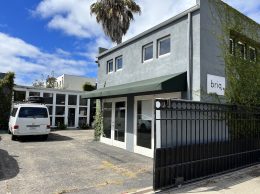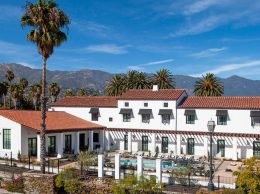$86.2M Sientra IPO plumps up public-company ranks
IN THIS ARTICLE
- South Coast Topic
- Stephen Nellis Author
By Stephen Nellis Friday, September 26th, 2014
With Santa Barbara-based breast implant maker Sientra’s Sept. 19 announcement that it plans to raise up to $86.2 million, the IPO has returned to the Tri-Counties in a big way.
Sientra’s filing is the fourth initial public offering announced in the region this year, joining completed deals at Goleta-based Inogen and Santa Barbara-based Resonant for $70.5 million and $16.2 million, respectively. Atara Biotherapeutics in Westlake Village has filed papers to raise up to $92 million.
The deals come after the near death of the IPO market during the recession and the departure of several public-company headquarters from the region. Since 2010, five public companies have either been acquired or taken private in the Tri-Counties.
But the number of new ticker symbols from the region has begun to catch up, and both San Luis Obispo-based Mindbody and Thousand Oaks-based Xirrus have signaled that they might go public sometime this year or next.
Bill Watkins, director of the Center for Economic Forecasting and Research at California Lutheran University in Thousand Oaks, said that going-public deals are important because they are one of the few bright spots in the recovering California economy.
“The IPO is an indication that there’s some vibrancy there and some growth opportunity,” he said. “The California economy is in large part being driven by that sort of growth. One thing it does is bring a lot of wealth to the community.”
Sientra’s deal would have particular significance because it would return the Tri-Counties to prominence in the $600-million-a-year breast-implant industry. The region historically hosted the headquarters of the biggest players in the sector and even supplied much of the raw materials used in the devices.
Sientra has raised $151 million in venture capital to date and gained notoriety in 2012, when it became only the third company in the nation to receive U.S. Food and Drug Administration approval to sell silicone breast implants. Sientra was also the first company to introduce teardrop shaped implants to the U.S. market, with competitors Mentor Worldwide and Allergan following suit.
If successful, Sientra would list under the symbol SIEN on the New York Stock Exchange. Sientra also would be the second medical device company in the region to go public this year, after Inogen.
Silicone breast implants were essentially banned in the U.S. for 14 years until 2006. The lifting of the ban kicked off a flurry of interest in Inamed and Mentor Corp., the two firms with approval to sell them. In 2005, Inamed was bought by Allergan for $3.2 billion. Johnson & Johnson bought Mentor Corp. for $1 billion in 2009.
Mentor underwent layoffs, though the company has declined to confirm exact figures. Earlier this year, Irvine-based Allergan said it would shutter its Goleta facility and shed the 300 jobs there.
Sientra has said that at least some of its capital raise is earmarked for hiring — potentially from its diminished rivals.
“We intend to increase our direct sales capabilities through the hiring of additional, experienced sales representatives and support staff. We believe that continued expansion of our sales team will allow us to broaden our market reach and educate a broader group of plastic surgeons on the benefits of our products,” the company said in its filings.
New regulatory regime
Sientra was founded in 2007 by Hani Zeini, a veteran of Inamed.
Zeini assembled a team that bought the North American subsidiary of a Brazilian implant company called SiliMed and shepherded the products through the U.S. approval process. (In a sign of just how important the Tri-Counties is to the implant industry, SiliMed’s Brazilian-made implants use silicone gel supplied by Santa Paula-based Applied Silicone. Mentor’s implants are made with gel from Nusil, a Carpinteria firm.)
Between founding Sientra and bringing its products to market, Sientra endured both a downturn in the U.S. economy and a regime change at the FDA.
“We realized that at the FDA, there’s a new team. We realized our job was not to fight them, as was the temptation, but to embrace them and manage them,” Zeini said at a Santa Barbara speaking engagement in 2013.
Court battle with Mentor
Not long after Sientra received its approvals and began selling its implants, Mentor sued the company, alleging that Sientra had unfairly competed against Mentor by hiring away key sales people. Sientra won the lawsuit last year, and Mentor did not appeal.
“After a year of discovery and draining us, and six and a half weeks in court, they did not show one iota of evidence to support any of the allegations in the complaint. We put on our side of the case in six days,” Zeini told the Business Times last year in an interview.
Sientra has expanded sales quickly. Between 2012 and 2013, its revenues grew 237 percent, from $10.4 million to $35.1 million. Revenue for the first half of 2014 is $21.9 million, up 22 percent from $17.9 million the same period a year earlier.
JOBS Act rules
Sientra is considered an “emerging-growth company,” which means it doesn’t have to disclose compensation for all executives, only has to present two years of financial data and faces looser rules around verifying its internal accounting controls.
Sientra is unambiguous that it is not going public to become an acquistion target. It has a number of anti-takeover measures in place: Directors are elected on staggered terms and can’t be summarily replaced, shareholders can only make proposals at an actual meeting rather than through written consent, and shareholders must give advanced notice of any proposals. Only the board chairman, CEO Zeini or a majority of directors can call a special meeting of shareholders.
Sientra’s current major owners are Abingworth Bioventures with 18.6 percent of shares, OrbiMed Private Investments with 33.8 percent, Clarus Lifesciences with 29.8 percent. Zeini owns 6.3 percent of the firm.
The deal’s underwriters are Piper Jaffray & Co., Stifel, Nicolaus & Co., Leernik Partners and William Blair & Co. Santa Barbara attorney Tom Hopkins of the law firm Cooley is handling legal work on the offering.












